#geoffrey duke of brittany
Text
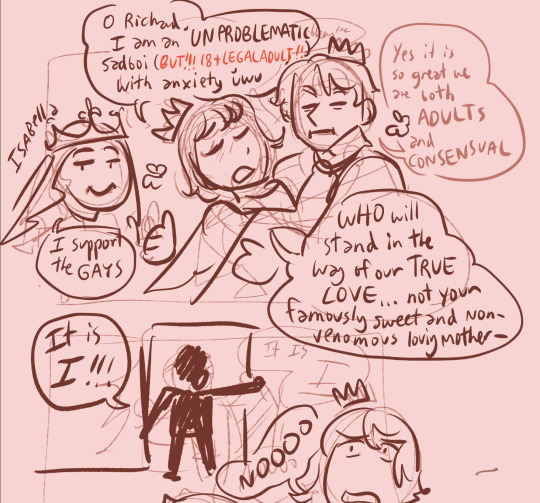

100% unproblematic medieval gays representationzzz
#richilippe#i guess#geoffrey duke of brittany#i love how he is the evil woman in the yaoi#Y’all know what this is about.#I’m sorry
18 notes
·
View notes
Text
Some Lion in Winter screen caps for all of our sorrows

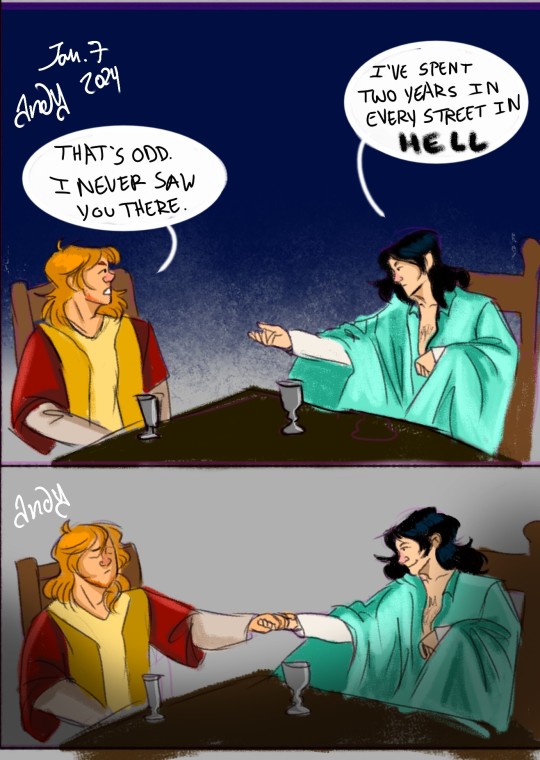
Wanted to go for more like... redhead/blond Plantagenets
#hobbit talks#andy rambles#hobbit draws#the lion in winter#plantagenets#medieval history#richard the lionheart#john lackland#phillipe augustus#geoffrey duke of brittany
10 notes
·
View notes
Text

Henry Junior and Geoffrey devastate the countryside (1183)
6 notes
·
View notes
Photo




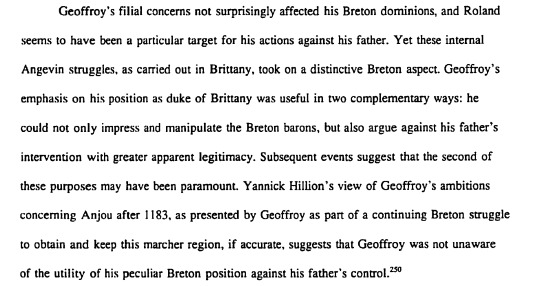


Jean Markale, Celtic Civilization
Eric Borgnis Desbordes, Arthur de Bretagne (1187-1203): L’Espoir breton assassiné
Mark Benton, To Embrace the King: The Formation of a Political Community in the French County of Anjou 1151—1247
Mari-Anna Sohier, Étude des actes de la duchesse Constance et de sa famille
Karen Jankulak, The Cult of St Petroc in Cornwall and Brittany c. 550 to c. 1250
Joëlle Quaghebeur, Prier Notre-Dame, protéger la Cornouaille
Judith Everard, Brittany and the Angevins: Province and Empire 1158-1203
#twelfth century#Duke Geoffrey#he's so funny to me#*geoffrey of brittany knocking on the glass noises* hey my family sucks can i use yours instead
9 notes
·
View notes
Text
@2kyears
“You are a distraction I don’t need,” Geoffrey told the dark-eyed boy lying next to him. “As much as I love a good bit of sodomy I am trying to fight a war with my brother. And so far the bastard is winning."
He sat and began pulling on his breeches. He like all of Henry II's sons thought of himself more as a soldier than a prince. But he wasn't a butcher. Granted he'd raided his share of monasteries to pay his men and fill their bellies with the fat larders only men of god seemed to have. But the Barons of Brittany had never rebelled against their young Duke though they had ample reason too. His father had made Conan IV their duke and they had hated him. When they rebelled Henry II disposed of him and seized the lands for himself before giving them to Geoffrey. The Bretons were proud and with long memories. They hated the upstart Count of Anjou but had no reason yet to hate his son, he'd been tremendously careful not to give them one.
His brother Richard on the other hand seemed to him a mad dog. He'd assumed the reports from the Aquitaine nobles given to him and his brother also named Henry were exaggerated. Now he knew they were not.
He stood and reached toward Maurice. "Be a good boy and get up, you're on my shirt."
21 notes
·
View notes
Text
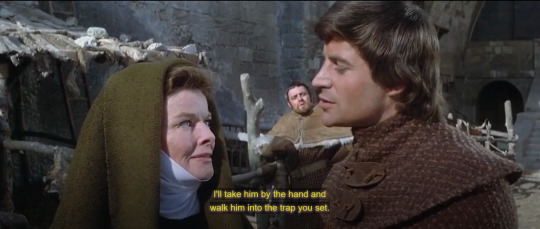
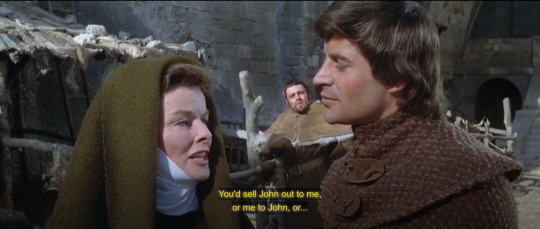


[ID: screenshots of a conversation between Eleanor of Aquitaine and Geoffrey, Duke of Brittany, in the film The Lion in Winter. Geoffrey says, "I'll take him by the hand and walk him into the trap you set." Eleanor replies, "You'd sell John out to me, or me to John, or... you can tell me... have you found some way of selling everyone to everybody?" Geoffrey says, "Not yet, mummy, but I'm working on it." /end ID]
#i know you know i know#the lion in winter#they're the best characters in the entire film#richard's trying to be normal and they're just doing That in plain sight
33 notes
·
View notes
Text
“The psychological investment of medieval English royalty in their children seems generally not to have been great. Yet the family life of Henry II, Eleanor of Aquitaine and their children had more than most royal families’ share of hostility. The stormy relationship between Henry II and his sons is almost a classic example of father-son relations in feudal society. They saw him preventing their attaining full manhood with lands and authority of their own, and their resentment pushed them into rebellion. Henry was a restless man with a violent temper, and his sons often bore the brunt of his impatience and anger. The estrangement between Henry and his queen by 1170 must have had an effect on their children’s feelings, and the couple’s hostility can account for some of the boys’ lack of affection for their father. Once they reached adolescence, they lacked any loyalty to him; and their rebellions gave a tragic quality to his last years. […]
William of Newburgh, a northern chronicler, wrote of Henry II’s ‘inordinate love for his sons’ and accused him of trampling on others’ rights ‘while he exerted himself unduly for their advancement’. Yet little concrete evidence survives for Henry’s feelings toward his children except his schemes for succession to his lands. It is difficult to know whether Henry II was applying any principle in his partition of his territories, whether he had any vision of the Angevin domains as a unity or viewed them simply as a block of family lands to be used to provide for his offspring. Henry gave his sons honourific titles in 1169 when they were adolescents, hinting at an ‘Angevin empire’ with at least a loose structure held together by family ties. His eldest son and namesake, crowned king of England in 1170 at age fifteen, was to have the Anglo-Norman realm together with greater Anjou (Anjou plus Maine and Touraine); his second son, Richard, was proclaimed duke of Aquitaine, when he was fourteen; and Geoffrey became count of Brittany through marriage at age eleven; along with his continental county went the English earldom of Richmond. Little John ‘Lackland’ had no place in this tripartite partition. Most scholars agree that Henry II followed feudal custom in rejecting strict primogeniture succession of Young Henry to all his domains; he had both Angevin and Anglo-Norman precedent in feudal law for his scheme. Probably Henry held the hope that as his sons grew up, he could share the governing of the Angevin domains with them, withdrawing from day-to day work into something like ‘the chairman of a family consortium’.[…]
The birth of John in 1166 exacerbated relations between Henry II and his older sons, for he did not want his lastborn to remain ‘John Lackland’. His periodic new schemes for partition of his empire angered Young Henry, Richard, and Geoffrey, feeding their jealousy of each other and of their youngest brother. Such schemes especially aroused Richard’s resentment once his elder brother’s death promoted him to senior rank among the sons. Any younger son had uncertain prospects; and since Richard and Geoffrey were ahead of John in any division of Henry II’s acquisitions, his prospects were even less certain. He must have known from literature and from his own family’s history that the youngest of several sons often got nothing. Twelfth-century vernacular poetry is filled with tales of younger sons forced to leave home to seek their fortunes as knights errant. Insecurity about his future, rivalry with his brothers and awareness of their resentment over his father’s schemes to find land for him must have influenced John’s character. No youth growing up in such an atmosphere of suspicion and treachery could fail to absorb some poisons.”
— Ralph V. Turner, King John: England’s Evil King?
15 notes
·
View notes
Text
The Lioness of Brittany
This lady from Brittany lived from 1300-1359 and her real name was Jeanne-Louise de Belleville de Clisson Dame de Montaigu. She was a noblewoman from Brittany who, as heir to her family, took over the estates and the salt trade, and later a Pirate.
She married for the first time at the age of 12, the 19-year-old Geoffrey de Châteaubriant VIII, who died in 1326, and had her first two children with him at 14 and 16. After his death, in 1328, Jeanne married Guy de Penthièvre of the House of Penthièvre, widower of Joan of Avaugour and son of the Duke of Brittany, for the protection of her children. The union was short-lived, as relatives of the ducal family, particularly from the de Blois faction, complained to the bishops of Vannes and Rennes to protect their inheritance, and an investigation was held on 10 February 1330, leading to the annulment of the marriage by Pope John XXII. Then, in the same year 1330, Olivier IV de Clisson married a very wealthy Breton. They had five children together: Maurice, Guillaume, Olivier, Isabeau († 1343) and Jeanne. In 1342, Olivier, joined the Duke of Brittany Charles de Blois in the Breton War of Succession defending Brittany against the English claimants and the forces of English sympathizer John de Montfort.
During the ensuing campaign, Olivier came under suspicion and criticism from Charles de Blois for failing to hold Vannes against the English forces so Clisson defected to the English side. January 1343, the Truce of Malestroit was signed between England and France and under the perceived safe condition of this truce Olivier and fifteen other Breton lords were invited to a tournament on French soil. He was arrested and beheaded for treason against the king. His head was sent to Nantes, where it was presented on a spit on the battlements of Bouffray Castle near Nantes. His widow, Jeanne, swore revenge on the king and Charles de Blois, who had happily supported the death sentence.
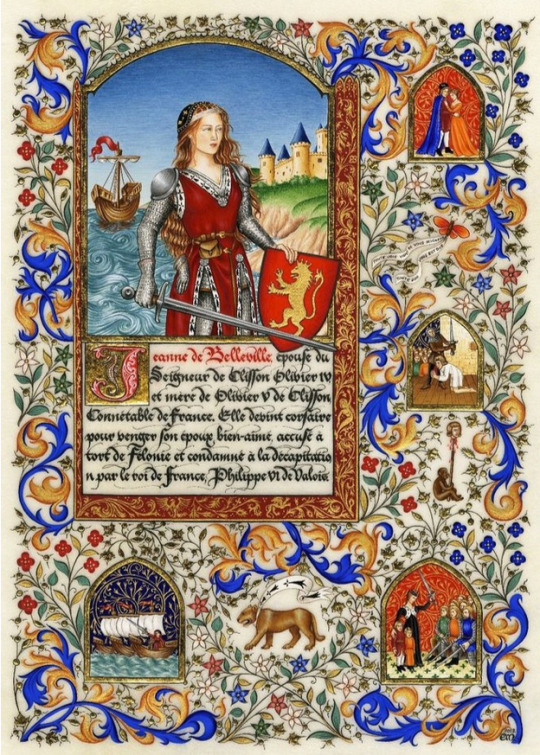
A painting of Jeanne in a mock 15th century style, part of a composition by Elsa Millet. (x)
Her revenge consisted of selling her possessions and buying a ship. Dismayed by the death of her liege lord, she quickly found a crew of 400 men and together they hunted down French merchant ships. After several successful battles, including two attacks on two castles, her ship was badly damaged and she had to flee. She found protection and support in England and from King Edward. He and Breton sympathisers gave her money and she was able to buy several war cogs, which she had painted black and fitted with red sails, the flagship was named My Revenge. Because of this appearance, the fleet received the name Black Fleet. The ships of this Black Fleet are said to have first attacked ships in the Bay of Biscay, but then advanced into the English Channel to hunt down French merchant ships, killing entire crews and leaving only a few witnesses to carry the news to the French king. This earned Jeanne the nickname "The Lioness of Brittany" or in French “La Tigresse bretonne” (The breton tigress).
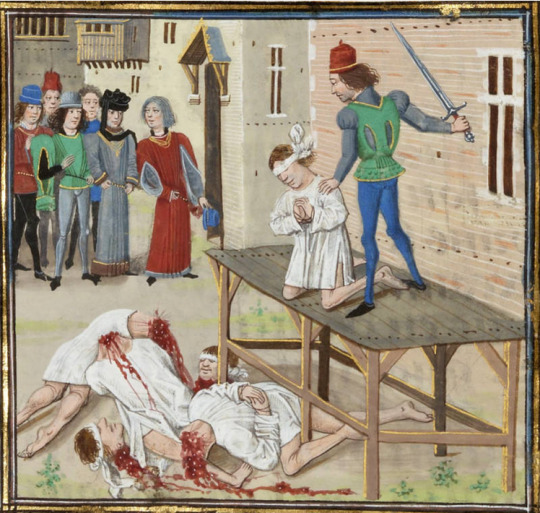
Execution of Olivier IV de Clisson. Painting attributed to Loyset Liédet, Flemish illuminator (v.1420-v.1483) in the Chronicles of Lord Jehan Froissart. (x)
She is sometimes referred to in literature as a privateer of the English, which would imply that she was subject to certain protections and obligations, but there was no known letter of marque.
In 1346, during the Crécy campaign in northern France, Jeanne used her ships to supply the English forces.
In the process, the French eventually succeeded in attacking her fleet and sinking her flagship. Jeanne and her two sons drifted at sea for five days; her son Guillaume died from the effects of the cold. Jeanne and Olivier were eventually rescued and taken to Morlaix. But this did not stop their revenge, on the contrary Jeanne continued her piracy in the Channel for another 13 years.
She probably ended her revenge in 1356, but by 1850 she had married the English nobleman, Walter Bentley, lieutenant to King Edward III until 1353 and captain of the English troops who continued to fight Charles de Blois. For his services and inheritance, both had received lands and castles in Brittany, which they were to relinquish in 1353 in order to finally achieve peace Charles de Blois. Bentley refused and was imprisoned in the Tower of London. Jeanne, tired of fighting, gave up and handed over the lands they had wanted. He was then released and in January 1357, the barony of La Roche-Moisan was granted to them. Toward the end of her life, she returned to France and has lived in Hennebont castle until the end of her life in 1359.
#naval history#female pirate#jeanne de belleville#the lioness of brittany#14th century#medieval seafaring
81 notes
·
View notes
Text
Capétiens vs Plantagenêts: a matter of suzerainty.
It was also his position as suzerain which gave Louis VII the chance of interfering in and inflaming the quarrels which raged in the Angevin family. This was an effective means of weakening his great antagonist. Henry II and Eleanor produced a large family, and reared four of their sons to the age at which custom demanded that they should be provided for. Their eldest son Henry was granted Normandy in October 1160 and was associated with his father on the throne of England in 1170. Richard was given Aquitaine in 1169 and Geoffrey Brittany in 1175. John, the youngest child of Henry and Eleanor, was not old enough to be entrusted with any estates until the very last years of his father's reign, and by the time he came of age all the available lands had been given away. As Duke of Normandy, Duke of Aquitaine, Count of Poitiers, the sons of Henry II came to perform homage to the King of France and became his men. It was in vain that Henry II sought to utilise the Norman procedure of pariage to maintain the unity of his continental territories in favour of his eldest son, the "Young King" Henry. (Under pariage the eldest son succeeded to all the heritable property and was alone answerable for it to the suzerain; each of his brothers received a share, but held it of him). This device could not be put into full operation in Aquitaine, which was not part of Henry's heritage but Eleanor's. And when she granted it to Richard, he owed homage not to his father or his eldest brother, but to the King of France. The Young King Henry had done homage as Duke of Normandy to Louis VII in October 1160. When he repeated his homage in 1170 it was made to embrace Anjou, Maine, and Brittany as well. At the same time Richard did homage to Louis for Aquitaine.
It is true that in 1174 Henry II compelled his sons to perform homage to him after their rebellion, but this new homage did not necessarily annul their homages to the King of France. Henry II himself had done homage to Louis VII in 1151 and again in 1169, and was to perform it yet again to Louis's successor, Philip Augustus, in 1180. Thus throughout the conflict between Louis VII and Henry II the French king's suzerainty was affirmed and recognised. This did not save Louis from defeats at his vassal's hands. Nevertheless, to judge from the Toulouse affair in 1159, Louis' suzerainty occasionally cramped Henry's style, and put him in the wrong in the eyes of contemporaries, including the barons of his continental fiefs. To play the rebel vassal was hardly prudent for a king when many of his own vassals were rebelliously inclined. It was not that the idea of rebellion itself shocked feudal society. On the contrary, it was one of the legitimate courses open to a vassal needing to safeguard his rights against the encroachments of his suzerain. But in the disputes between Louis VII and Henry II, Henry was the law-breaker as well as the vassal in revolt. For his rebelliousness against an impeccable suzerain there could be no justification.
It may be objected that Louis VII was constantly intriguing with Eleanor of Aquitaine and with Henry II's sons. But after all Eleanor, as Duchess of Aquitaine, was herself a royal vassal. Two of Henry's sons had done homage to Louis. Another, Geoffrey, by dint of his father's vassalage, was the French king's rear-vassal. And the king had, as suzerain, not merely the right but the duty to concern himself with the welfare and harmony of his great vassal's family, to ensure that a proper settlement was made on the sons. It would be unfair to accuse Louis of hypocrisy; nor did Henry ever complain that the French king was making trouble in his family. Louis' own grievances against Henry were many and varied, and Henry never made a serious effort to deny their validity.
Thus from 1154 to 1180 Henry II had the appearance of a vassal engaged in unjustifiable revolt against his suzerain. This line of conduct undermined his own position. It constantly reminded the baronage of the Angevin fiefs that the King of France was Henry's suzerain- if only because his suzerainty was so often invoked. And it helped to prevent the fusion of the individual elements of the Angevin empire on the continent. Provincial separation, already too strong for Angevin rule to subdue, was reinforced.
Robert Fawtier- The Capetian Kings of France
#xii#robert fawtier#the capetian kings of france#louis vii#henry ii of england#aliénor d'aquitaine#henry the young king#richard the lionheart#geoffrey plantagenêt#john lackland#jean sans terre
7 notes
·
View notes
Text
I need to finish the book on William Marshal which I started reading, but it's gone No True Scotsman, and really dislikes Geoffrey Duke of Brittany for actions which are FINE when Henry the Young King does them.
2 notes
·
View notes
Text
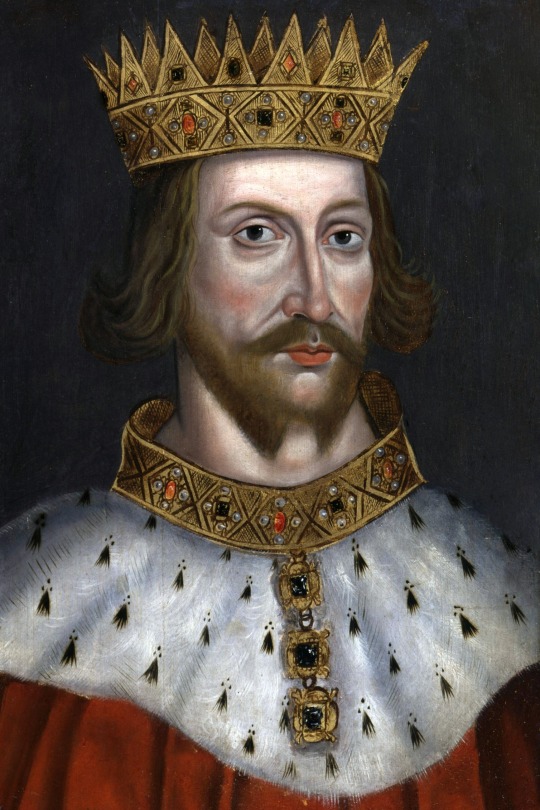
Born at Le Mans, on March 5, 1133, Henry II (also known as Henry Curtmantle, Henry FitzEmpress or Henry Plantagenet), ruled as King of England, Duke of Normandy and Aquitaine, Count of Anjou, Maine and Nantes, and Lord of Ireland.
At various times, he also partially controlled Scotland, Wales and the Duchy of Brittany.
In sum, Henry controlled England, large parts of Wales, the eastern half of Ireland and the western half of France; an area that would later come to be known as the Angevin Empire.
The son of Geoffrey of Anjou and Matilda (daughter of Henry I of England), Henry II was an energetic and sometimes ruthless ruler, driven by a desire to restore the lands and privileges of his grandfather, Henry I.
His desire to reform the Church, for example, led to conflict with his former friend and Lord Chancellor, Thomas Becket,Archbishop of Canterbury; a controversy that lasted for much of the 1160s; eventually resulting in Becket's murder in Canterbury Cathedral in 1170.
Henry's empire quickly collapsed during the reign of his son, John; though many of the changes introduced during Henry's rule had long-term consequences. His legal changes are generally considered to have laid the basis for the English Common Law. While his intervention in Brittany, Wales and Scotland, is said to have shaped the development of their societies and governmental systems.
Henry died on July 6, 1189. He had wished to be interred at Grandmont Abbey in the Limousin. But hot weather that season made transporting his body impractical, and he was instead buried at the nearby Fontevraud Abbey.
5 notes
·
View notes
Text
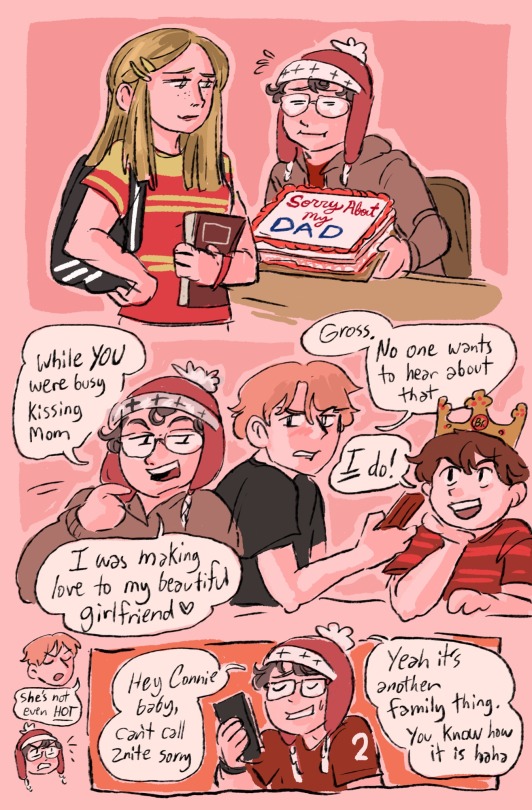
Geoffrey and Constance being the sitcom B plot couple in the background of the tumultuous family drama of the Burger King AU.,Richard and John are of course, still being annoying about it.
Imagining they have some sort of cheesy romcom dynamic where Connie hates him at first bc Henry got her dad fired! And now they're forced to work together on a volunteer group project...but then they actually get along and make bonds with the other group project people despite the rocky start. He doesn't die in this AU he just eventually goes no-contact with the family RIP
#Burger king AU#Geoffrey Duke of Brittany#Geoffrey of Brittany#Constance duchess of Brittany#Constance of Brittany#Sorry for all the tags I can't decide#Plantagenets#Angevins#Historical RPF#Modern au#Lmao#My art#Burger king Geoffrey
6 notes
·
View notes
Text
Eleanor of Aquitaine- Grandmother of Europe.
(part II)
Second Marriage
When Eleanor returned to Poitiers, Henry II duke of Normandy ordered his younger brothers to kidnap Eleanor and claim her lands, however that was not needed,because Eleanor herself sent a messenger telling Henry to marry her at once if he wanted. On May 18 1152 the couple married in secret. However, Henry and Eleanor were even more closely related, while her first marriage was annulled due to Consanguinity. Even more, A marriage between Henry and Eleanor's daughter Marie had earlier been declared impossible due to their status as third cousins once removed and now he was marrying the mother of the previous refused match. The reason for the secret marriage was that Eleanor’s choice for her second husband was a problem: as the rulers of French vassal states, Henry and Eleanor needed permission to marry from the king of France, and there was little chance that Louis was going to approve the marriage, besides Eleanor met Henry in 1151, well aware of his claims to English throne and his wealth, she took certain interests in him, later historians claim that as seed of divorce was already sprouting that time, so future couple came to an agreement that once she was divorced they would marry, that would explain why they started to act immediately after divorce. However, the source those historians mentioned from Eleanor's contemporary scribe did not survive.
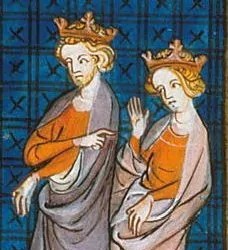
On October 25 1154 Henry became king of England and pregnant Eleanor was crowned queen on 19 December of the same year. On 28 February 1155 second child Henry the young was born, first child being William IX, Count of Poitiers. Over the next 13 years the coupe had 8 children, five sons and three daughters:
William (17 August 1153 – 1156)
Henry the Young King (28 February 1155 – 11 June 1183)
Matilda of England (June 1156 — June/July 1189)
Richard I (8 September 1157 – 6 April 1199)
Geoffrey II duke of Brittany ( 23 September 1158 – 19 August 1186)
Eleanor, queen of Castile (1161– 31 October 1214)
Joan queen of Sicily (October 1165 – 4 September 1199)
John Lackland (24 December 1166 – 19 October 1216)
Despite so many children Henry was by no means faithful of Eleanor and had numerous mistresses and illigitimate children. While Eleanor resented Henry's mistresses, she certainly had no hostility towards their children as when Geoffrey of York was acknowledged the Queen took him under her care.
Marriage has other problems as well, both parties were highly political, ambitious and stubborn. Aquitaine openly rejected the authority of Henry and declared that they would obey only the rightful duchess. After the third marriage and widowhood of Eleanor's first husband, marriage between "Young Henry" and Margaret of France was arranged,that is thought to be the last known co-operative decision of the couple,because after 6 following years of constant arguing,conflicts and power play, marriage was finally stained per Eleanor's discovery of Henry's affair with Rosamund the fair. Following the marriage of Matilda, third daughter of Henry and Eleanor, in 1167 Eleanor returned to Poitiers.
Court at Poitiers
While residing at her home, she hosted a legendary court. Most of the stories are just folklore and rumors, it is obvious that she was a great patron of art,poetry and literature. However, the famous "court of love" is mostly rumor. First of all, Courtly love was widely popular in France even before her birth,which I mentioned was the reason of her birth in the first place, therefore she could not have "invented" it as some mention. 12th century author Andreas Capellanus, a famous admirer of love of his time, mentions how Eleanor and her daughter Marie, listened to young lovers, acted as jury and supporting love out of wedlock as heartbroken queen rejected the coexistence of love and marriage. However, this is pure fiction created by Capellanus,as Marie and Eleanor did not spend that much time together, but it's based on Eleanor's actual support of teaching manners and kind of creating "etiquette" regarding treatment of spouses.All that can be said is that her court at Poitiers was most likely a catalyst for the increased popularity of courtly love literature in the Western European regions.

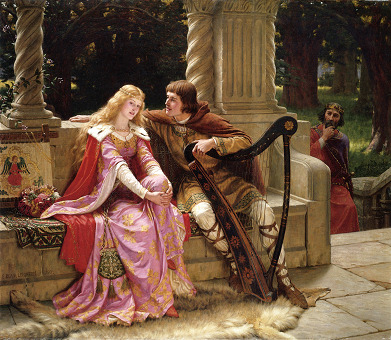
Different paintings inspired by the court of love.
Involments in Rebellion (1173-1174)
In 1173 the young Henry(junior king of England from 1170) started the Rebellion against his father, which Eleanor supported. The young king went to Aquitaine where Eleanor and his two younger brothers Geoffrey and Richard resided. Contemporary historian Roger of Hoveden claims that the queen sent her younger sons to France "to join with him[Henry the young] against their father the king."Once her sons had left for Paris, Eleanor encouraged the lords of the south to rise up and support them. In 1174 Eleanor herself left Aquitaine,but was captured and imprisoned by her husband. Young Henry was pardoned as, likely due to the involvement of Eleanor and Henry himself not wanting to punish sons, blame was put on barons,who were punished for manipulating young prices to do the evil deed.
Imprisonment
From 1174 to 1189 Eleanor spent her life as a prisoner. She was put under the house arrest in various English palaces,where she was under supervision of the king. She was permitted to see her sons only during special occasions, namely Christmas. That is the time she grew particularly estranged to her husband and favourite son Richard. During the first nine years of imprisonment she was minimally active in politics, but when King's mistress Rosamund the fair suddenly died in 1176 under quite mysterious circumstances, rumors rose that it was Eleanor who arranged her death by poisoning. Legend has it that Eleanor sneaked into her rooms and offered her to die either by dagger or by poison, which she eventually chose. Other legends say that she was roasted alive between two fires or her arms were cut off in the bath. However, all of them appear either in the 14th century's "French chronicles of london" or during Elizabethan era tales and balades, so they can not be true, however considering no recorded disease or accident around Rosamund,it seems quite sensible that Eleanor, who had certain freedom, could have bribed one of Henry's servant to poison her. The theory is the oldest, appears in the early 13th century, little time after Eleanor's death. It's justified by Rosamund's fault in estranging the couple and Henry's supposed plans to use Rosamund to force Eleanor into divorce. What really happened is unknown and the incident was quickly forgotten.
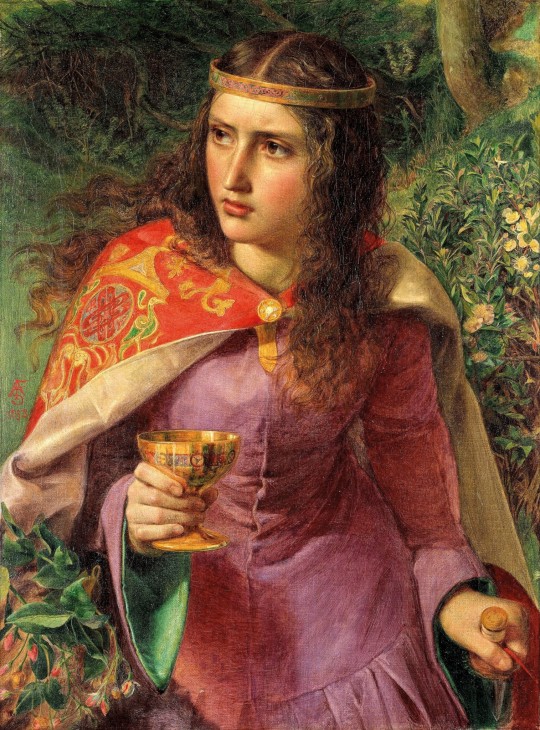
Queen Eleanor as depicted by Frederick Sandys. We can see her carrying a bowl of poison and a dagger.
On Saturday, 11 June 1183, the young king realized he was dying and was overcome with remorse for his sins. When his father's ring was sent to him, he begged that his father would show mercy to his mother, and that all his companions would plead with Henry to set her free. So Eleanor was set free and permeated to see her son one last time.Her major rise to power started in 1183 when Philip of France demanded lands in Normandy,which was the property of deceased young Henry. However, lands in Normandy was Eleanor's prior passing it to son, so after his death it should have been returned to her, as a result, Henry summoned Eleanor and sent her to Normandy, where she spent several months,but returned to England in 1184, after that she was technically free,but under supervision. She would often accompany her husband and even took part in deciding some political affairs. Upon the death of her husband Henry II on 6 July 1189, Richard I succeeded, One of his first acts as king was to send William Marshal to England with orders to release Eleanor from prison. During widowhood she gained power she never had before.
The Queen mother
After her release Eleanor rode to Westminster and received the oaths of fealty from many lords and prelates on behalf of the king. She would then act as regent for her son,who was fighting long wars. On 13 August 1189, Richard left for Portsmouth. Later he was absent from 1190 to 1194 for crusades and later was in captivity of the holy Roman emperor. During that time Eleanor was an unofficial regent, overseeing any decisions made by council and even went to Austria to personally arrange the release of her son. Her influence is evident by letters to the Pope,the holy Roman emperor and the king of Castile. Richard died in 1199 and Eleanor then became a major force in the reign of John Lackland.under the terms of a truce between King Philip II and King John, it was agreed that Philip's 12-year-old heir-apparent Louis would be married to one of John's nieces, daughters of his sister Eleanor of England, queen of Castile. Eleanor, who was 77-78 that time, herself went to Castile to choose one of the princesses. Same year she was kidnapped by Hugh IX of Lusingan.(that was not the first and last attempt of kidnapping her, actually it was the third out of four known occasion), she however arranged her freedom herself. In Castile, she remained for two months and returned to England after choosing Blache as the bride. The trip is said to affect her health.

Despite reducing health and increasing age, intrigues were not ending in her life, the war broke between John and Arthur the son of Eleanor's second son Geoffrey. The reason for the conflict was the succession to the English throne. After Richard I died without an heir, the throne was supposed to pass to the following brother Geoffrey,who died before Richard,but had a posthanous son Arthur,who was heir over John. Eleanor however supported the claim of John, as a reason very familiar instance of her life took place, she was kidnapped...again. After negotiations she was released with the condition that she would withdraw from politics and go to nunnery(which could have been her own choice). She died soon after in 1204 and was buried with her second husband in Fontevraud abbey.
one of many of her achievements I would like to underline the most is her age. after giving birth to 10 child in 12th century,being imprisoned for 9 years in castle, went to crusades, traveled in Austria and castle in her late 70's, she still managed to live up until 82 years, almost twice as much as avarage lifespan of her time.
My next post is going to be about women in the Ottoman empire so...
6 notes
·
View notes
Note
OMG its BLORBO BLEEBUS: Geoffrey, Constance and Eleanor 😈

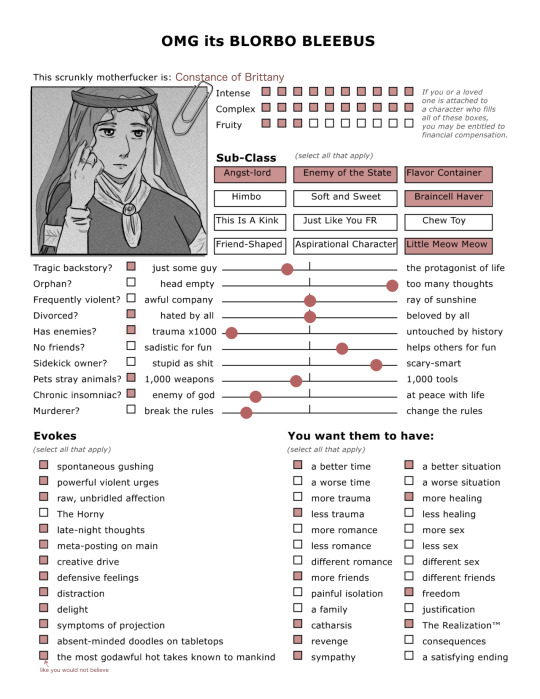

#I hope it's okay if I assumed you meant Eleanor of Cobham 😈😈😈 (if not I'm actually really sorry and apologize)#3 for 3 in getting bad takes but I suppose otherwise what would we have to bond over complaining about together? 😅#had to look at them through Not My Eyes for some of these bc eg they are all the protagonist of life to me etc haha#(i think constance could increase her ability for a girlfriend but I see her as someone who doesn't really register flirting well. so rip.)#love how this ended up as it looking like Eleanor got dragged in with the Wrong Crowd (as opposed to actively being set up)#Duke Geoffrey#constance of brittany#twelfth century#eleanor of cobham#fifteenth century#heartofstanding#ask#shakespeareomnibus#ask thing
5 notes
·
View notes
Text
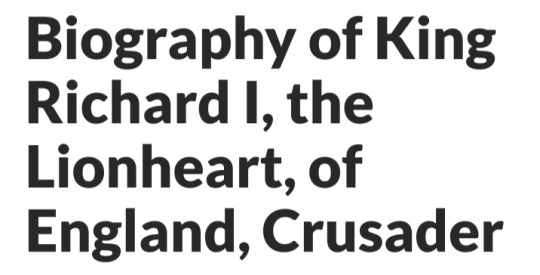

Richard the Lionheart was an English king and one of the leaders of the Third Crusade.
He is known both for his military skill and the neglect of his realm because of his long absence.
Early Life
Born on 8 September 1157, Richard the Lionheart was the third legitimate son of King Henry II of England (5 March 1133 – 6 July 1189).
Often believed to have been the favorite son of his mother, Eleanor of Aquitaine (c. 1122 – 1 April 1204), Richard had three older siblings, William (who died in infancy), Henry and Matilda, as well as four younger: Geoffrey, Lenora, Joan, and John.
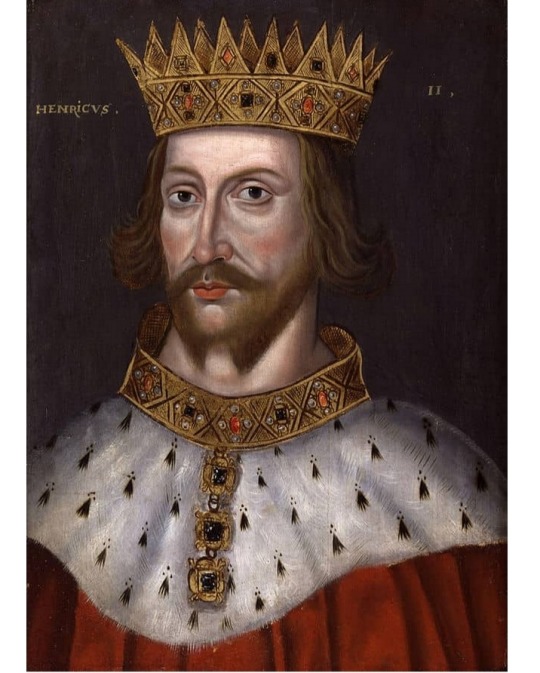
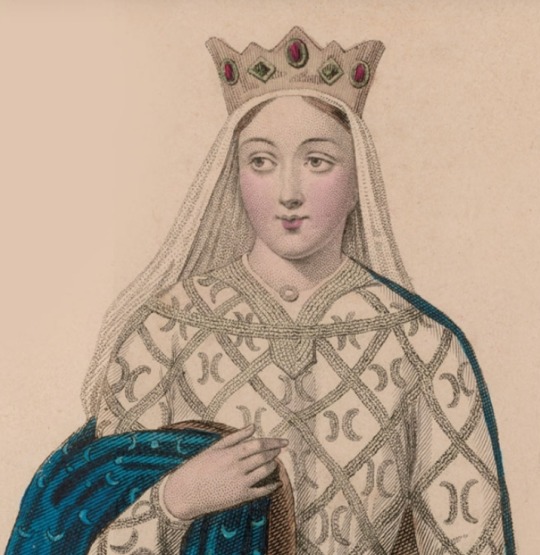
King Henry II of England and Eleanor of Aquitaine
As with many English rulers of the Plantagenet line, Richard was essentially French and his focus tended to lean toward the family's lands in France rather than England.
Following the separation of his parents in 1167, Richard was invested duchy of Aquitaine.

King Richard I of England / Richard the Lionheart
Revolt Against Henry II
Well-educated and of dashing appearance, Richard quickly demonstrated skill in military matters and worked to enforce his father's rule in the French lands.
In 1174, encouraged by their mother, Richard and his brothers Henry (the Young King) and Geoffrey (Duke of Brittany) rebelled against their father's rule.
Responding quickly, Henry II was able to crush this revolt and captured Eleanor.
With his brothers defeated, Richard submitted to his father's will and asked for forgiveness.
His greater ambitions checked, Richard turned his focus to maintaining his rule over Aquitaine and controlling his nobles.
Shifting Alliances
Ruling with an iron fist, Richard was forced to put down major revolts in 1179 and 1181–1182.
During this time, tensions again rose between Richard and his father when the latter demanded that his son pay homage to his older brother Henry.
Refusing, Richard was soon attacked by Henry the Young King and Geoffrey in 1183. Confronted by this invasion and a revolt of his own barons, Richard was able to skillfully turn back these attacks.
Following the death of Henry the Young King in June 1183, Richard's father King Henry II ordered John to continue the campaign.
Seeking aid, Richard formed an alliance with King Philip II of France in 1187. In return for Philip's assistance, Richard ceded his rights to Normandy and Anjou.
That summer, upon hearing of the Christian defeat at the Battle of Hattin, Richard took the cross at Tours with other members of the French nobility.
Victory and Becoming King
In 1189, Richard and Philip's forces united against Henry II and won a victory at Ballans in July.
Meeting with Richard, Henry agreed to name him as his heir. Two days later, Henry died and Richard ascended to the English throne.
He was crowned at Westminster Abbey in September 1189.
Following his coronation, a rash of anti-Semitic violence swept through the country as Jews had been barred from the ceremony.
Punishing the perpetrators, Richard immediately began making plans to go on a crusade to the Holy Land. Going to extremes to raise money for the army, he finally was able to assemble a force of around 8,000 men.
After making preparations for the protection of his realm in his absence, Richard and his army departed in the summer of 1190.
Dubbed the Third Crusade, Richard planned to campaign in conjunction with Philip II and Emperor Frederick I Barbarossa of the Holy Roman Empire.
The Crusade Begins
Rendezvousing with Philip at Sicily, Richard aided in settling a succession dispute on the island, which involved his sister Joan and conducted a brief campaign against Messina.
During this time, he proclaimed his nephew, Arthur of Brittany, to be his heir, leading his brother John to start planning a revolt at home.
Moving on, Richard landed in Cyprus to rescue his mother and his future bride, Berengaria of Navarre.
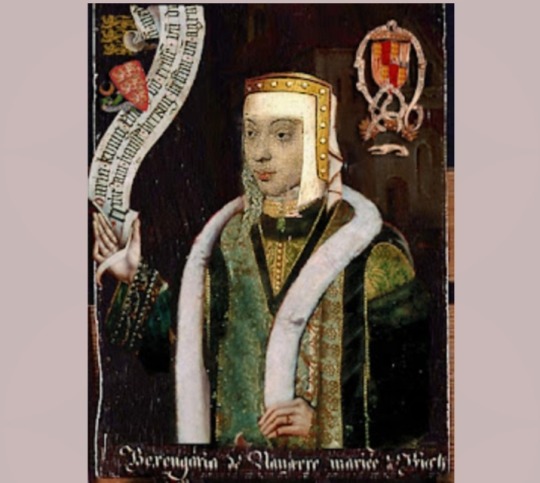
Berengaria of Navarre
Defeating the island's despot, Isaac Komnenos, he completed his conquest and married Berengaria on 12 May 1191.
Pressing on, he landed in the Holy Land at Acre on June 8.
Shifting Alliances in the Holy Land
Arriving in the Holy Land, Richard gave his support to Guy of Lusignan, who was fighting a challenge from Conrad of Montferrat for the kingship of Jerusalem.
Conrad was in turn backed by Philip and Duke Leopold V of Austria. Putting aside their differences, the Crusaders captured Acre that summer.
After taking the city, problems again arose as Richard contested Leopold's place in the Crusade.
Though not a king, Leopold had ascended to the command of Imperial forces in the Holy Land after the death of Frederick Barbarossa in 1190.
After Richard's men pulled down Leopold's banner at Acre, the Austrian departed and returned home in anger.
Soon after, Richard and Philip began arguing in regard to the status of Cyprus and the kingship of Jerusalem.
In poor health, Philip elected to return to France leaving Richard without allies to face Saladin's Muslim forces.
Battling Saladin
Pushing south, Richard defeated Saladin at Arsuf on 7 September 1191 and then attempted to open peace negotiations.
Initially rebuffed by Saladin, Richard spent the early months of 1192 refortifying Ascalon. As the year wore on, both Richard and Saladin's positions began to weaken and the two men entered into negotiations.
Knowing that he could not hold Jerusalem if he took it, and that John and Philip were plotting against him at home, Richard agreed to raze walls at Ascalon in exchange for a three-year truce and Christian access to Jerusalem.
After the agreement was signed on 2 September 1192, Richard departed for home.
Returning to England
Shipwrecked en route to England, Richard was forced to travel overland and was captured by Leopold in December.
Imprisoned first in Dürnstein and then at Trifels Castle in the Palatinate, Richard was largely kept in comfortable captivity.
For his release, the Holy Roman Emperor Henry VI demanded 150,000 marks.
While Eleanor of Aquitaine worked to raise the money for his release, John and Philip offered Henry VI 80,000 marks to hold Richard until at least Michaelmas 1194.
NOTE: Michaelmas is the feast of St. Michael, September 29.
Refusing, the emperor accepted the ransom and released Richard on 4 February 1194.
Returning to England, Richard quickly forced John to submit to his will but did name his brother as his heir, supplanting his nephew Arthur.
With the situation in England in hand, Richard returned to France to deal with Philip.
Death
Constructing an alliance against his former friend, Richard won several victories over the French during the next five years.
In March 1199, Richard laid siege to the small castle of Chalus-Chabrol.
On the night of March 25, while walking along the siege lines, he was struck in the left shoulder by an arrow.
Unable to remove it himself, he summoned a surgeon who took out the arrow but severely worsened the wound in the process.
Shortly thereafter, gangrene set in and the king died in his mother's arms on 6 April 1199.
Legacy
Richard has a mixed legacy, as some historians point to his military skill and the daring necessary to go on crusade, while others emphasize his cruelty and neglect for his realm.
Though king for 10 years, he only spent around six months in England and the remainder of his reign in his French lands or abroad. He was succeeded by his brother John.
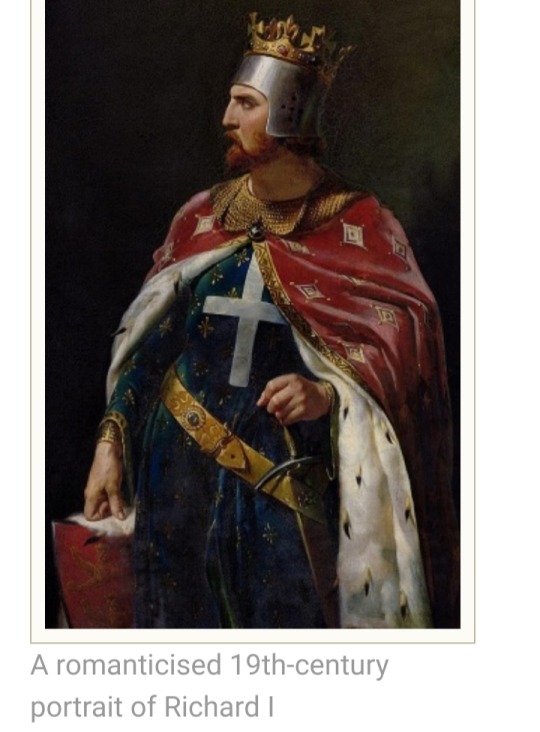
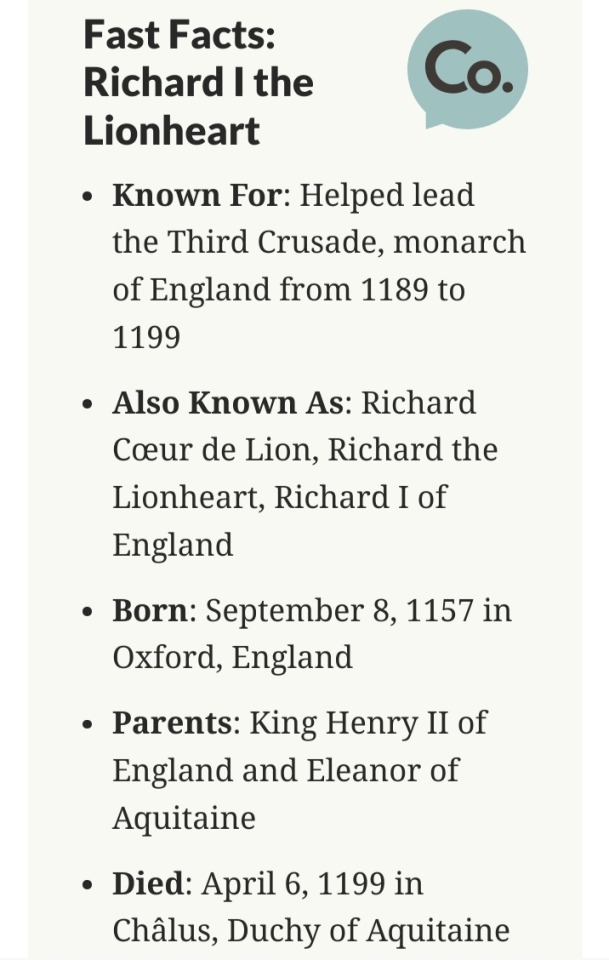
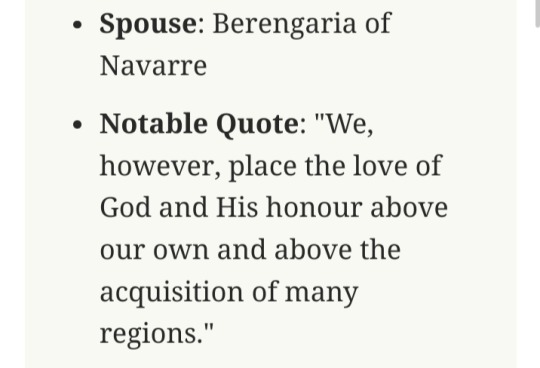

#King Richard I of England#Richard the Lionheart#King Henry II of England#Eleanor of Aquitaine#House of Plantagenet
15 notes
·
View notes
Note
eleanor of aquitaine, both husbands, kids from both marriages, and any grandchildren you prefer <3
Aight that is indeed a lot of people...LET'S DO IT :D They'll be pretty short bc that's a lot of people
Eleanor of Aquitaine:
-One hell of a sarcastic woman, everything she says usually bleeds sarcasm (her daughter Matilda is equally just as sarcastic)
-Somehow has the patience to put up with her kids' dumbassery
-T A L L W O M A N (very tall I don't make the rules)
-Says she loves her kids equally, but prefers her daughters (and Richard) more
-Remember how I said Empress Matilda is intimidating? Meet her equally intimidating daughter in-law
Henry II:
-Poor guy misses half of his wife's sarcasm and then immediately turns to stare at her like "wait a god damn minute"
-"I don't know where my sons got the idea of teenage rebellion from-" Has family members who are the living definition of teenage rebellion
-While his wife is tall af, he's actually pretty average. So their children range from tall to short.
-"I had a bad day and will now proceed to make it everyone's problem :)"
Louis VII:
-Well y'know, one day you're married and have 2 beautiful daughters and the next day you're a single dad
-Tries his best to be a dad, but let's be real dad wasn't part of the job description
-Watches the absolute chaos that is his ex-wife's new family with a bowl of popcorn
-Pretty much a girl dad because that's what happens when you have 5 daughters
Marie of France (the eldest):
-On pretty good terms with her half-siblings on both sides, but holy SHIT is it tiring to be the eldest on both sides
-Pretty chill mom (four kids are easy to manage)
-Geoffrey would probably be her favorite brother. As for favorite sister? She won't say anything.
-Actually has a little bit of sass in her, she just doesn't show it.
Alix of France:
-Way to happy to be here
-Much like her older sister, she's a pretty chill mom; however, 7 kids is a lot more work than 4 kids
-Tougher than she looks with an added bonus of some of her mother's sarcasm
-Her and Eleanor, Fair Maid of Brittany would've gotten along SO well. She would've been the BEST aunt hands down.
William of England (the baby):
-Baby
-Absolute baby
-That's it send tweet
Henry the Young King:
-Best big brother...but only to his younger sisters. His brothers can go suck an egg half the time.
-I feel like he totally could be like his mother if he wanted to. Just to piss his father off.
-Him and Matilda are the number one sibling duo they do everything together
-Him and Margaret of France? Best friends to husband and wife. You can't convince me otherwise.
Matilda of England:
-Looks like her mom, acts like her mom. (Mom loves it, dad hates it. Grandma however gets a kick out of it)
-100% done with her siblings' shit
-Probably told the Holy Roman Emperor to fuck off after giving birth to her third kid.
-Absolutely 100% done with that guy's shit too btw.
Richard the Lionheart:
-His mother absolutely adores him as much as his sisters
-Him and his wife have a somewhat healthy relationship that's much better than his parents (I said what I said) however, they're more friends than a married couple
-Him and his sister Joan are the MOST CHAOTIC PAIR IN THE WHOLE FAMILY
-Stopped giving a fuck by the time he was a teenager (that was a GREAT decision)
Geoffrey II, Duke of Brittany:
-He's the sibling who has dirt on anyone and everyone who fucked with him
-Would have a mug that says "#1 Dad" let's be real. He'd also be the type of dad who shows off photos of his kids bc he's so proud.
-Probably the only brother with a marriage effective in both the management and family life departments
-"Of course I'm friends with Dad's enemy's son and Richard's maybe-boyfriend. What's the worst that could happen?" Famous last words-
Eleanor of England, Queen of Castile:
-Named after her mother, acts nothing like her
-Would probably cry if someone yells at her
-Best mom ever (her and Geoffrey would probably just talk about their kids for hours)
-"We just have a few kids, nothing too bad." Has more than "a few" kids
Joan of England:
-Looks like her dad, acts a LOT like her grandmother and mother
-Takes NO shit from anyone (probably called the king of Cyprus a bitch after her and her sister in-law shipwrecked and he captured them)
-Remember how Joan's mom is tall and her dad isn't as tall? Well...Joan's short. Very short. Which adds to the chaos levels.
-The amount of S A S S this woman radiates
King John (the youngest):
-Probably gets picked on for being the baby of the family
-"Yes I know I married a 12 year old. What about it?"
-I would say good uncle since several of his siblings had kids, but *gestures to the whole mess with Geoffrey's kids*
-Tried to be a good dad, but y'know
And now...some of the MANY grandkids...
Berengaria, Queen of Castile:
-The apple of her parents' eyes and the eldest
-Best big sister best big sister BEST BIG SIS-
-Best mom as well
-Has no idea what kind of stuff her family's on
Eleanor, Fair Maid of Brittany:
-Her parents' baby (until her sister was born)
-Would absolutely give her uncle and cousin hell for what they did if they weren't kings (and if her dad hadn't beaten her to it)
-Would've adored her half-sisters from her mother's third marriage
-Something tells me she probably would've adopted some of her dad's behaviors (because that's the Plantagenet way)
Arthur I, Duke of Brittany:
-I've made several posts about him, so...coolest big brother ever. He lets his little sisters sit with him in meetings.
-Probably acts a lot like his mother, but has a bit of the anger that runs through his dad's family
-If him and Philip II of France's daughter Marie had married...I'm predicting a possible power couple right there.
-He would've been a great king god damn it John-
Joan, Queen of Scotland:
-Hopeless romantic 100%
-Gets along with her brothers so well, it almost rivals Henry the Young King and Matilda
-Is very much like her aunt Eleanor, she will cry if someone yells at her
-Tries not to pay attention to her shitstorm of a family
Marie of Champagne, Latin Empress:
-The younger daughter and namesake of Marie of France, she is the spitting image of her mother and acts almost exactly like her.
-Absolutely adores her two daughters despite the small amount of time she had with them.
-Her husband is head over heels in love with her, but she wishes he would just...calm down a little bit.
-Got along with her siblings for the most part
3 notes
·
View notes